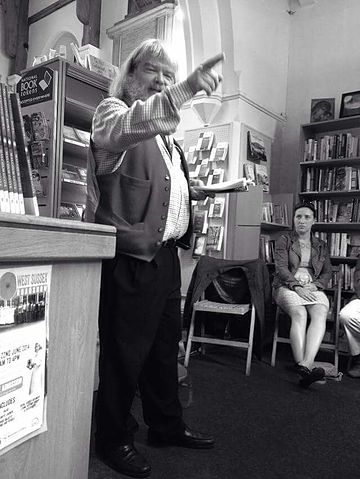An Experiment in Poetry: Malcolm Guite Illuminates Reality's Dark Corners
/An Experiment in Poetry is a weekly series here at MoralApologetics.com spotlighting poets whose work points to transcendent values and encourages us to contemplate questions at the heart of the human condition.
One of the best places on the internet is the blog of singer, song-writer, poet, Anglican priest Malcolm Guite. Regularly, nearly daily, Guite posts poems and reflections, including songs and beautiful visual art. Much of this material tracks the church calendar, with poems of all sorts to mark a feast day or special occasion. This is appropriate for the author of Sounding the Seasons (2012), a seventy sonnet sequence inspired by the lectionary and intended for worship and devotional reading.
In just fourteen short lines, Guite manages to demonstrate both the power and limitations of language and human thought to apprehend the divine, not so much telling his readers the point but inviting them to experience it themselves.
For Guite, poetry and theology are inseparable, a theme he explores insightfully in his 2017 Faith, Hope and Poetry: Theology and the Poetic Imagination. “Poetry,” with its heightened use of metaphor and symbol, Guite explains, “may be especially fitted as a medium for helping us apprehend something of the mystery embodied in that phrase ‘the Word was made flesh.’” Contra Derrida, words are no entrapping thing, keeping us locked in their web; rather, they link the immanent with the transcendent, a path traversed by the imagination.
If that sounds heady, that’s because it is. The book is part of the Ashgate Studies in Theology, Imagination and the Arts series, and it packs quite the theoretical punch. Guite himself is a bona fide scholar, with a Ph.D. from Durham University. Guite has published eight books, both collections of poems and academic treatises, including Mariner (2017), an excellent spiritual biography of poet Samuel Taylor Coleridge.
Guite has an expansive mind, evident in his profound poetry that never fails to illuminate a dark corner of our often-mysterious reality. Take his sonnet “Poem: A Lens,” for example. In just fourteen short lines, Guite manages to demonstrate both the power and limitations of language and human thought to apprehend the divine, not so much telling his readers the point but inviting them to experience it themselves. Linking physical space—of say, a church—and mental activity (like theology), Guite reminds us that we now see through a glass darkly:
. . . . All thought’s a narrowing of sites.
Before him every definition fails,
Words fall and flutter into emptiness,
Like motes of dust within his spaciousness.
But, important to remember, we do still see; it’s a grace made possible by the One we see, including the means he has provided for the seeing:
Till this opacity of stone on stone,
This trace of light and music on the air,
This sacred space itself becomes a lens
To sense his presence who is everywhere.
Educated as Guite is, poetry is never a mere intellectual affair; his expansive mind is matched by an equally expansive heart. In 2017 at the Oxbridge C. S. Lewis Institute, I had the opportunity to hear Guite read a bit of his poetry and sing some of his songs, and I’ll never forget the joy of that evening. His physical appearance—massive beard and flowing hair, pipe in mouth and professorially layered in vests and jackets—is a throwback to a bygone era (I would say medieval if not for the negative connotations of that word).
While I can’t remember the specific poems he read that night, I do remember that it was an hour of worship and celebration of God’s good gifts of beauty and imagination and community. That’s what Guite’s poetry reminds us of, of the blessing it is to be human—because in being human we are known and loved by our Creator. Guite’s is no Pollyannaish view, however; he writes, too, of the unavoidable sadness and tragedies that humans experience. His exultation comes by knowing that this suffering is not the end of the story, a truth powerfully conveyed in Guite’s sonnet honoring St. John of the Cross.
In his introduction to the poem, Guite explains, “But [St. John] did not give in to darkness, rather he perceived that it might become fruitful, the darkness not of evil but of God, that the way down might become the way up, that hidden even in the deepest darkness was the promise of that light which the darkness can never overcome.”
In lines befitting Advent, Guite closes the poem:
We wait in darkness for him to be born.
Before he rises, light-winged with the lark,
We’ll meet with our beloved in the dark.
We live in a world where Christ’s kingdom has come, but is not yet fully revealed or fulfilled; it’s the time of the already but not yet. The pressure of the longed-for “not yet” can often be too much to bear, tempting us to jettison the hope of Christ’s ultimate consummation. What Malcolm Guite’s poems can remind us of, what they can in fact invite us to experience here and now, is the eternal abundance of the already.
Links for This Week’s Featured Poems
“Poem: A Lens” by Malcolm Guite
“Let Not Your Hearts Be Troubled” by Malcolm Guite
“What If” by Malcolm Guite
“Amen” by Malcolm Guite
“Transfiguration” by Malcolm Guite











